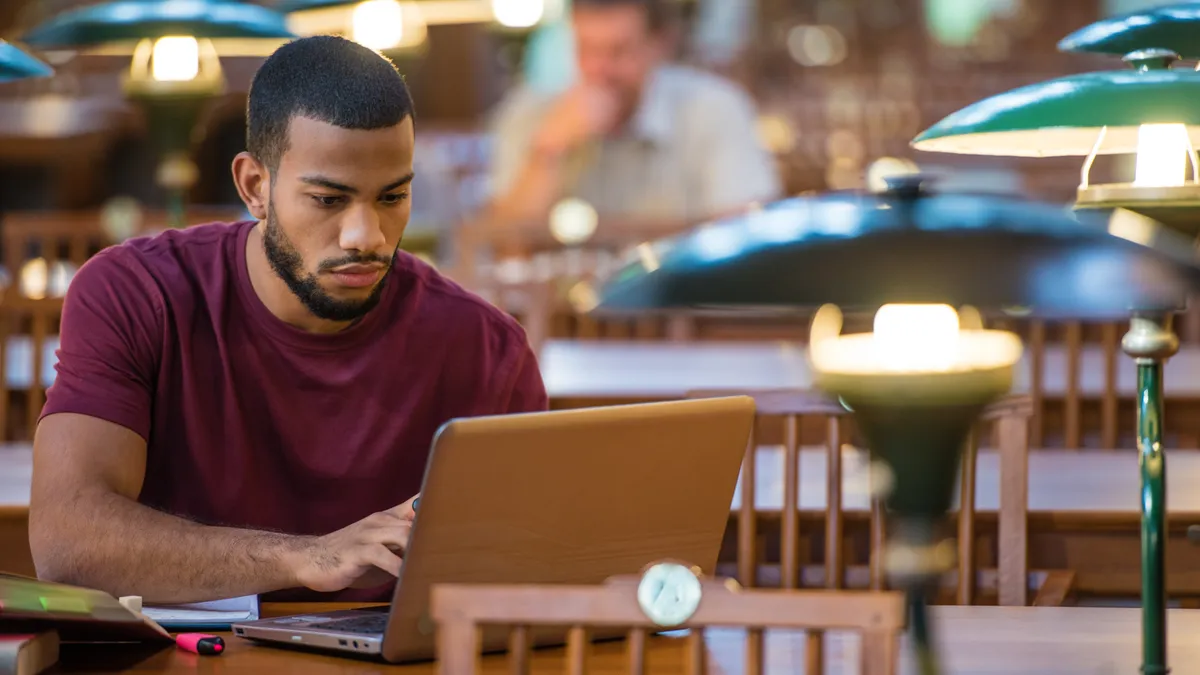Last week, the University of Massachusetts Global named a new chancellor to lead the institution as it attempts to grow its presence nationally and internationally.
The board selected David Andrews, who has served as UMass Global’s interim chancellor since May. Before that, Andrews was the president of National University, a nonprofit adult-serving institution in Southern California, from 2016 to 2021, during which time student enrollment grew from about 30,000 students to 45,000 students. Andrews also previously served as the dean of Johns Hopkins University’s education school from 2010 to 2016.
The University of Massachusetts created UMass Global last year by acquiring Brandman University, a private nonprofit based in California, from Chapman University. It is now affiliated with the University of Massachusetts system but operates as a private institution. It has its own board of regents, although several members overlap with the University of Massachusetts system's trustees.
Andrews laid out a vision for UMass Global to become "the leading open access institution of service to the traditionally underserved" when he was hired on a permanent basis.
We spoke with Andrews about the university and larger online trends.
This interview has been edited for clarity and brevity.
HIGHER ED DIVE: What attracted you to UMass Global?
DAVID ANDREWS: I am particularly interested in adult-serving institutions that are open access. We have a severe need to help adults retool and prepare themselves for better opportunities in the workforce, especially after the pandemic. The conversion of Brandman University into UMass Global has provided an opportunity for us to reach many more adult learners across the country. We have been predominantly in California and this is an opportunity to go across the country and essentially across the world in providing opportunities for working adults.
What are your top goals for the university in the coming years?
We need to fulfill our mission of serving as many adult learners as possible. We need to grow and expand our impact across a broader geography outside of California and throughout the United States and to build a stronger international set of programs that allow us to serve students wherever they are.
Do you have a specific kind of enrollment target? And if so, what is your game plan for getting there?
We don't have a specific enrollment target. But over the next 10 years, we would like to see ourselves at least triple in size to be able to not only remain competitive but to serve the type of students that we know we can reach. That's going to require new models, or new ways of thinking about the delivery model. These are very, very busy working adults who need to have the most flexible and accommodating schedules and delivery models possible.
When you say flexible models, are you referencing stackable credentials? Competency-based education?
Yeah, absolutely. Stackable credentials and competency-based education are part of the model — that is, you have to deliver some immediate return on the investment. Many of our students are looking to change opportunities with their current employer or looking to move to a completely new set of workforce opportunities. But they don't really have time to commit to a full-term degree program without seeing some benefits from that early, so we're seeing a lot of movement towards these stackable credentials.
In order to work closely with employers, we have to think about how to take professional development — which used to be uniquely outside of the university — and bring those more into alignment with what's going to be able to provide credit at the university and stack that to eventually getting a degree.
That's just part of the model. The other part of the model is a much more on-demand delivery system.
Competency-based education provides additional flexibility for students who are very busy. When we first moved into the online space — and even in the adult market — we would have synchronous online sessions at 5 o'clock, you know, right when somebody's transitioning from work to home and having to deal with children and dinner and all of those things that are part of life. It's just not realistic for people to be working in those strict timeframes that are more at the convenience of the institution than the student. Those who are going to be competitive and successful in the needs of students are going to be able to tackle that.
Some reports suggest we could be headed for a recession. If that were to happen in the next year or two, what would that mean for UMass Global students?
There's a counter-cyclical relationship between unemployment and people going back to school. Should unemployment present itself and become a major issue, we need to be prepared to help people get back into school and retool to get back into the workforce.
It also means working closely with industry, businesses and employers to make sure you're producing exactly what they want. That also helps reduce the acquisition cost of a student. Rather than going directly to students in a more retail type of model to see if they're interested in going to school, how do you partner most closely with industry so that you're providing exactly what the student needs?
Other systems and public universities are creating large online universities to serve adult students. Are you concerned about heightened national competition for this pool of students?
I think there will be some shakeout in that competition, but it puts more pressure on us to be innovative in our types of delivery models. It also means that the brand makes a difference. With UMass Global, we have a very strong brand that is recognized both nationally and internationally.



















